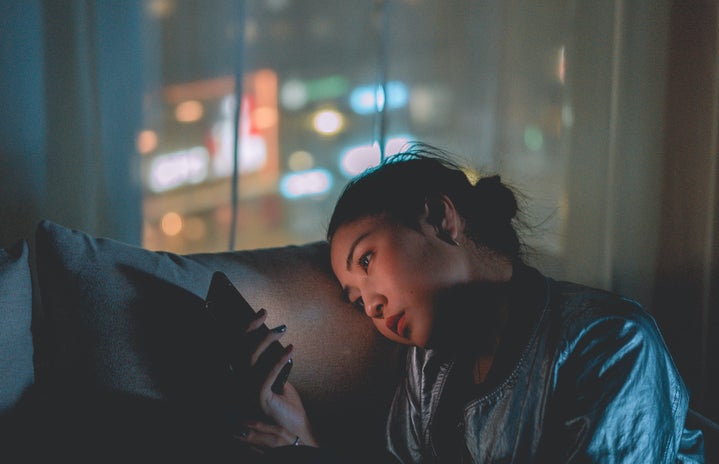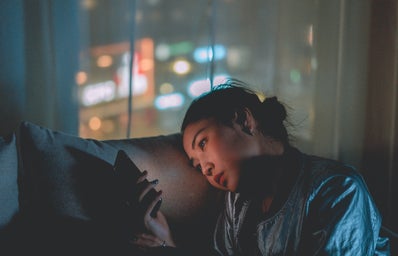When I stepped on AU’s campus as a freshman in August, I had high hopes that I would find my people. Many months led up to this moment: my Facebook and Instagram posts in the AU Class of 2025 served as my first impression online, but the stakes were much higher in person. My older friends in college told me that first impressions are critical to quickly making friends throughout the first week, whether they be people I’d grow close with or simply friends to grab meals with and hang out.
The first week of college felt like a speed-dating game to me—you met a bunch of people and exhibited your interests in hopes of establishing a common interest, except you searched for friends instead of potential partners. For the first month in college, what felt like hundreds of awkward waves to anyone I had met on campus gradually narrowed down to a few more meaningful ones. I still had a bunch of so-called acquaintances, though, whose engagements were naturally filled with small talk.
Although I almost always had plans with someone to grab dinner at the dining hall or get groceries outside of campus, something felt off inside. I keep thinking about my role in the friendships I made, realizing that many people knew me but had other friends as their “go-to’s” to hang out. I fit in but also didn’t, feeling like I couldn’t confide in anyone with personal information. What I had feared entering college seemed to be turning into a reality: I was no one’s first choice.
The Role of Self-Reflection in Feeling Better
Upon realizing I didn’t have a friend group, I felt disappointed in myself and questioned what I had or hadn’t done to end up where I was. Of course, I was grateful for my friendships, but I longed for a sense of belonging—to feel like I mattered to a group. Each night, I scrolled through social media, watching Snapchats of my friends at other colleges having a blast or reading Instagram comments of friends saying things like, “My favorite people!” to their group. Social media made me feel empty inside as it served as a constant reminder of something I wanted but seemed to lack.
Listening to my friends in college discuss their friendships in high school made me come to another realization—a more important one. Many of my friends talked about their time in high school; they referenced their friends’ names, showed me photos of them altogether, and planned group Facetimes to catch up on each other’s lives. Recognizing that they had strong relationships with their friends and did lots of traditional activities that friend groups do, I reflected on my own high school experience.
During my time in high school, I knew many people and almost always had plans with a friend. I was involved in a bunch of extracurriculars that exposed me to different types of people, many of whom I grew to become close with. I enjoyed being able to float around, choosing to hang out with who I wanted without worrying about putting tension on my other friendships. I had several close friends who I still consider my best friends, and each of them essentially did the same thing as me: navigate high school without a close group of friends they did everything with.
Despite some moments that felt isolating in high school, I was pretty satisfied with my social life. Reflecting on my happiness before college helped me feel better about my current situation, and it also helped me realize why I felt so sad about something that shouldn’t make anyone feel worse about themselves.
The notion of friend groups on social media is portrayed as something many of us desire because it shows the world that you matter to people while highlighting your social life. Social media is the primary contributor to the guilt I have endured since it made me believe I lacked a personal quality and therefore didn’t belong.
Coming to terms with the fact that there’s nothing wrong with not belonging to a tight friend group has allowed me to be kinder to myself. While there are definitely benefits of having a close circle of friends, there are also plenty of positives to being more of a floater.
Reframing The Idea of a “Floater”
Maintaining friendships with people from various backgrounds allows you to take something unique away from each relationship. You can go to multiple people with news and feel appreciated by their responses, and you can selectively tell certain people aspects of your life that align with the nature of your relationship.
It can be even more challenging for those of us who lean on the introverted side to put ourselves out there, so be kind to yourself! Not being in a friend group now doesn’t mean you won’t ever be in one, so keep an open mind and have gratitude for your current friendships.
Reminding Yourself of Your Worth
If you’re feeling isolated on campus, first understand that feeling lonely at times is perfectly okay. There’s an expectation that you’re supposed to feel happy—even when hanging out with friends—but that’s not always the reality. Sometimes, it can be difficult to enjoy the moment when you’re feeling down.
However, there are activities that can help you feel more connected with yourself and those around you. Taking walks around campus has helped me stay grounded and clear my head, which is something I would certainly suggest! Getting outside (although unmotivating when you’re in your dorm room) can boost your mood and reduce stress levels. Joining clubs is another outlet to meet new people, whether it be a more casual club or a deadline-driven one. Additionally, remind yourself of your favorite personal qualities by writing them down or journaling. Give yourself time to explore your interests, and, most importantly, spend time with people who make you feel good.


